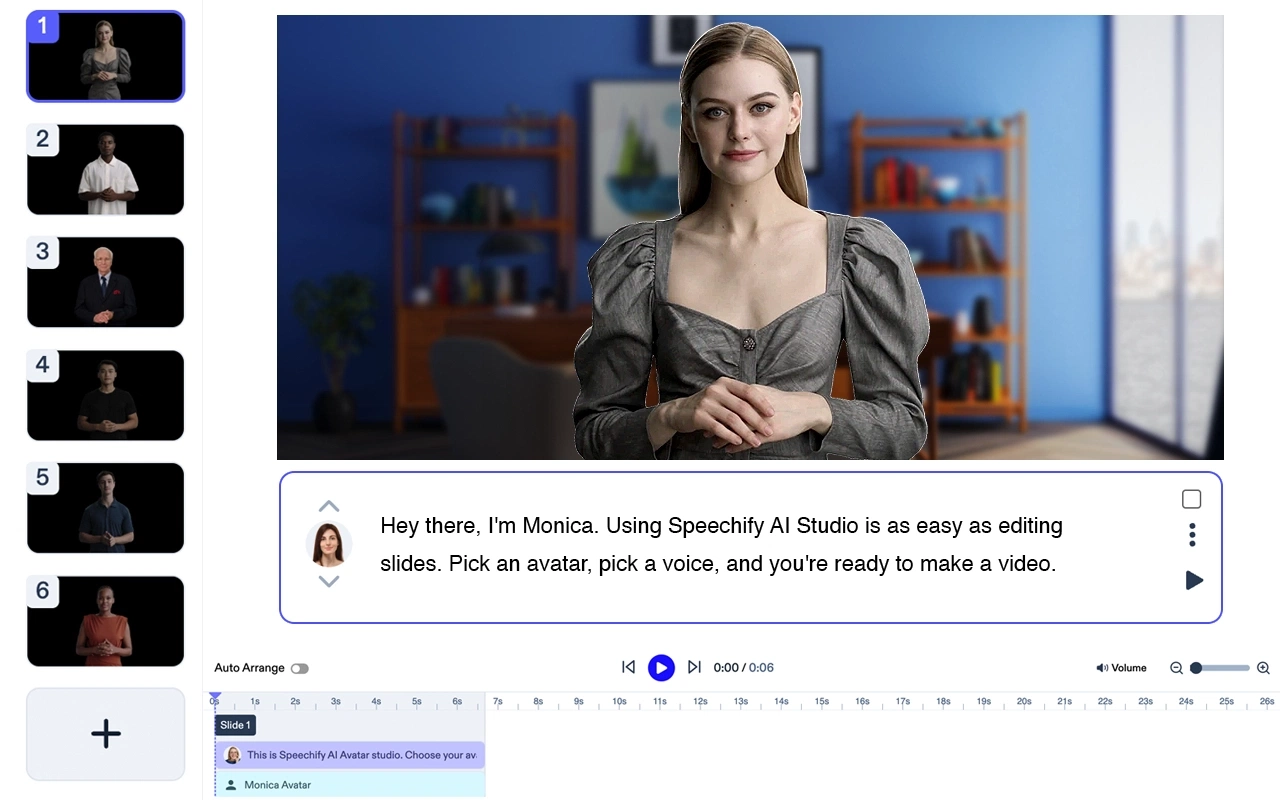Artificial intelligence (AI) technology is revolutionizing how we create videos, audiobooks, and animations. One exciting development is the combination of AI voices with human faces, making virtual characters more realistic and engaging.
This article dives into the technology behind AI voices with human faces and how you can leverage it for your projects. – especially if you cannot afford a voice actor. Getting to understand the concept.
What are AI Avatars?
AI avatars are digital personas created using advanced artificial intelligence technologies, specifically designed to perform roles traditionally occupied by human actors. These avatars can be crafted with detailed features, expressions, and the ability to mimic human emotions and movements, enabling them to take on any character within a narrative. Employed extensively in films, video games, and virtual reality experiences, AI avatars offer filmmakers and game developers the flexibility to push the boundaries of creativity without the logistical constraints of human performers. This technology allows for the exploration of new storytelling dimensions, where scenarios too dangerous, costly, or fantastical for humans become vivid and safely executable realities on screen.
It Starts with AI Text-to-speech
Let’s talk about how we can make a computer talk! It all begins with something called Text-to-Speech, which is like teaching computers to read out loud. This is a big part of how we create voices using Artificial Intelligence, or AI for short.
So, what is Text-to-Speech? Well, it’s a cool tool that changes written words into spoken words. It’s like having a robot read a book to you! People use this to make voices for cartoons, podcasts, and videos on the internet.
To make the computer sound like a real person, the TTS tool studies the words, the pauses, and even the grammar. It tries to understand how we, humans, talk and express feelings. It pays attention to the little things in our speech, like excitement, sadness, and how we stress certain words. This way, it can make the computer voice sound happy, sad, surprised—just like us!
With Text-to-Speech, you can even choose how you want the computer voice to sound. It’s like picking a new voice for your computer friend! So, if you ever wondered how we make computers talk and sound like real people, Text-to-Speech is the secret!
Bringing Avatars into the Mix with Text to Speech Voice Cloning
With advances in artificial intelligence and machine learning, some TTS and voice cloning software packages have introduced avatars. These are AI-generated human faces that speak in human voices and look just like real people.
Some of the most popular software that can create avatars include Synthesia, Elai, and Synthesys. These tools use different techniques to create avatars, including synthetic voices and speech2face technology.
Synthesia, for instance, uses machine learning algorithms to create avatars that match the gender, age, ethnicity, and body language of the user. The software can also animate the avatar’s facial expressions and lip movements to match the audio clip.
Elai, on the other hand, offers custom voice cloning services that can create avatars that look and sound like the user’s own voice. Synthesys API combines TTS technology with deepfake technology to create realistic avatars with various use cases, including podcasting and voiceovers for tiktok, radio, and TV ads.
Generative AI’s chatbot, ChatGPT, is the newest arrival in the world of natural language processing. The chatbot’s API uses cutting-edge technology and artificial intelligence to simulate realistic human conversations and quality audio. Unlike traditional chatbots that rely solely on text to interact with users, ChatGPT goes further by introducing face and voice to its conversations. This makes interactions with the chatbot more immersive, human-like, and natural.
How do AI Avatars Work?
AI avatars, or digital humans, are created by combining advanced text-to-speech technology with photorealistic graphics and deep learning algorithms. These algorithms are trained on large datasets of audio files and videos of human faces to create lifelike representations of human beings that can interact with users in real-time. The avatars’ movements, gestures, and facial expressions are all generated by complex algorithms that simulate human behavior.
One of the critical components of creating an AI avatar is the ability to generate a synthetic voice that sounds natural and expressive. This is done by training deep learning algorithms on vast amounts of audio data to create a model of human speech that can generate speech in a realistic, natural-sounding way. Once the synthetic voice has been developed, it’s combined with photorealistic graphics to create an avatar that speaks and moves just like a human.
The photorealistic graphics used to create AI avatars are made using various techniques, including motion capture and 3D modeling. The goal is to create a digital representation of a human that’s as realistic as possible, with accurate skin tones, facial features, and expressions. This is achieved by capturing high-quality images and video content of human faces and using machine learning algorithms to generate 3D models that can be animated in real-time.
The final piece of the puzzle is the real-time rendering of the avatar, which requires powerful graphics processing units (GPUs) and specialized software. This allows the avatar to respond to user input in real-time, with facial expressions and body movements that are generated on the fly.
AI avatars have a wide range of potential uses in various industries. They can be used in e-learning and explainer videos, allowing teachers and trainers to engage with learners interactively and dynamically. In marketing, avatars can be used in product demos and social media campaigns to bring products to life and make them more relatable to potential customers.
Avatars can also be useful in customer service to provide personalized, human-like interaction. Famous companies like Google and Amazon use avatars to make realistic spokespersons that connect with customer, boosting brand recognition and loyalty. Below you will familiarize with the benefits of human-like features in AI and the role in different industries.
Benefits of AI Avatars
AI avatars are transforming the entertainment industry by stepping into roles traditionally held by human actors. These digital creations are powered by advanced artificial intelligence, enabling them to perform in movies, games, and virtual reality environments with realistic expressions and emotions. By utilizing AI avatars, producers and developers can create more versatile and innovative content, pushing the boundaries of storytelling and user engagement. Here are some key benefits of using AI avatars in place of actors:
- Cost Efficiency: AI avatars can significantly reduce production costs as they eliminate the need for multiple takes, and their usage does not entail typical actor-related expenses like salaries or benefits.
- Flexibility: These avatars can be easily modified for different roles or appearances, offering unparalleled flexibility in casting and character development.
- Consistency: AI avatars provide consistent performances, which can be particularly useful in long-term projects or series where maintaining the same level of performance is crucial.
- Availability: They are available around the clock, allowing for a more flexible shooting schedule that is not constrained by human actors' availability.
- Innovative Storytelling: With AI avatars, filmmakers can explore new narratives and scenarios that might be impossible or too risky for human actors, such as extreme action scenes or fantastical environments.
- Global Reach: AI avatars can be programmed to perform in multiple languages, making it easier to tailor content for international markets without additional dubbing or subtitles.
The Good things about making AI more like us
Making machines act more like humans is super cool and useful. With the help of smart machine technology, or AI, we can talk to machines just like we talk to our friends. For example, there are special computer programs that can make voices that sound exactly like a human’s voice! This means when we watch YouTube videos or use apps with these voices, it feels more natural and fun. It also makes us feel more comfortable and trusting towards these smart machines.
As these smart machines get even smarter, we are starting to use them for more and more things. We want them to understand us and chat with us just like a real person would. Places like MIT, a really important school for technology, are trying to find new ways to make talking to machines even more like talking to humans. They are researching and experimenting to make these conversations with machines smoother and more natural.
Speechify AI Voice Generator – Get High-Quality AI Avatars

Speechify AI Voice Generator - Best Platform for AI Avatars
Speechify AI Voice Generator stands out as a premier platform for creating realistic AI avatars, offering unparalleled audio solutions for the entertainment and media industry. With its robust library of over 200 AI voices options available in multiple languages, Speechify AI Voice Generator provides diverse and lifelike voice options that can be tailored to any character or scenario. The platform’s 1-click dubbing feature simplifies the process of syncing these voices to AI avatars, making it incredibly efficient for producers to integrate seamless vocal performances. Additionally, Speechify AI Voice Generator’s cutting-edge voice cloning technology allows for the replication of unique voice tones and nuances, ensuring that each avatar not only looks but also sounds remarkably human. This combination of advanced features makes Speechify AI Voice Generator an ideal choice for anyone looking to elevate their production with realistic and versatile AI avatars.
FAQ
Can AI generate human faces?
Yes, AI can generate realistic human faces using machine learning algorithms and neural networks.
Can AI replicate human voice?
AI can replicate human voices using voice cloning technology and TTS software.
Are AI-generated faces real or fake?
AI-generated faces are synthetic creations based on real human faces, but they are not real people.
What is the difference between AI-generated faces and a face swap?
AI-generated faces are entirely new faces created by AI, while a face swap involves swapping one person’s face onto another person’s body.
What is the difference between AI and machine learning?
AI is the broader concept of creating intelligent machines, while machine learning is a subset of AI that focuses on teaching computers to learn from data.
Is it possible for AI to sound like a human?
AI-powered TTS and voice cloning software can generate voices that sound remarkably human-like.
What are some of the dangers of AI-generated faces?
AI-generated faces pose risks such as identity theft, deepfake creation, and the spread of misinformation.
What is the difference between AI voice and human voiceovers?
AI voices are natural-sounding AI voices generated by TTS software and algorithms, while human voices are produced by natural vocal cords and speech mechanisms.
What are some apps that can create an AI voice with a human face?
Speech2Face, ChatGPT, and There are a few companies, such as Speech2Face, ChatGPT, and Lovo.ai, that provide software solutions for speech synthesis. These solutions can produce AI voices that are accompanied by human-like faces.




